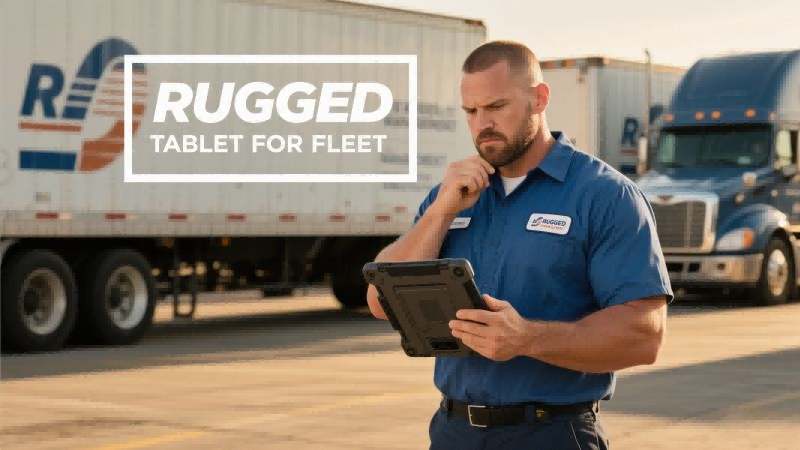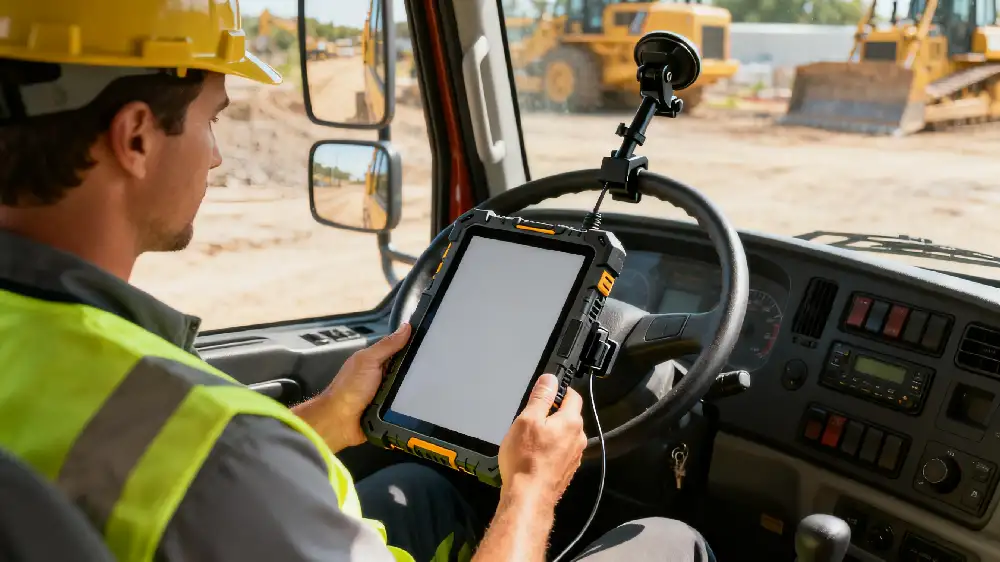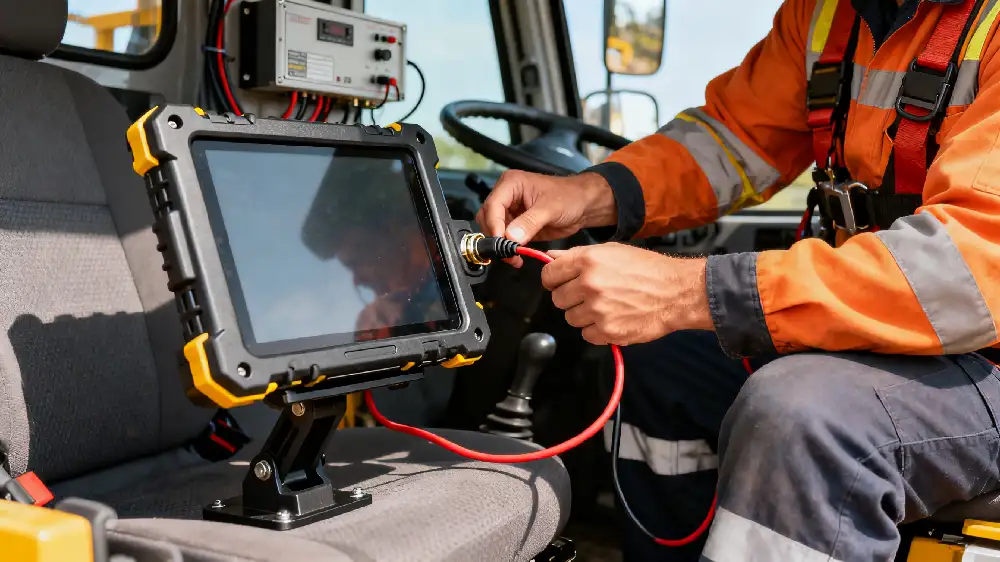If you’e looking to supercharge your fleet management, logistics operations, or simply upgrade your Heavy Duty Vehicles with truly reliable technology, then you’ve landed on the right page. We’re diving deep into the world of Tablet for Vehicle Mount Computers—but not just any old tablet. We’re talking about the game-changing, mission-critical equipment: the Rugged Tablet.
You might be thinking, “Why can’t I just slap a regular consumer tablet onto a car mount?” That’s a common mistake, and here’s the cold, hard truth: for environments that involve constant vibration, extreme weather, and continuous operation, you need something tougher, something built for the long haul.

Picture this: you’re a truck driver navigating a long, bumpy stretch, or a field service engineer working at a dusty construction site. You need real-time navigation, dispatch updates, inventory access, and maybe even a quick video call with HQ. A consumer device would crumble, overheat, or lose connectivity in minutes. That’s why a professional-grade Rugged Vehicle Tablet is essential. It’s designed to be shockproof, waterproof, dustproof, and seamlessly integrate into your vehicle’s complex electrical system.
In this guide, I’ll walk you through how to choose the right device, the safest and most compliant ways for how to fix tablet in car, and why specialized gear like the Waysion Q777 Rugged Vehicle Tablet can be the perfect partner for your toughest jobs. Let’s get started!
The Crucial Difference: Why You Need a Rugged Tablet
First, let’s define the terrain. What are heavy duty vehicles? These are the workhorses of the industry: massive freight trucks, construction equipment, excavators, agricultural tractors, forklifts, and specialized vehicles used in public safety or defense. Their environment is inherently demanding, characterized by:
- Extreme Vibration: High-torque engines and poor road conditions subject electronics to constant, brutal shaking, which can quickly destroy standard hard drives and circuit board connections.
- Environmental Hazards: Exposure to dirt, moisture, extreme heat (inside a parked cab) or cold (during winter operations).
- High Usage: Drivers often wear gloves, requiring large, pressure-sensitive displays and high-brightness screens to combat glare.
In such a challenging setting, your device must be a fortress, not a fragile pane of glass.
What is a Rugged Tablet?
A rugged tablet is a purpose-built computing device designed to survive where consumer products fail. They adhere to stringent standards, most notably the military-grade MIL-STD-810H for shock and vibration resistance, and IP ratings (e.g., IP65, IP67) for protection against ingress (dust and water).
The key advantages include:
- Durable Chassis: Constructed from high-strength plastics or magnesium alloy, capable of surviving significant drops.
- Sealed Ports: Gaskets and covers protect all connections from the elements.
- Wide Temperature Range: Guaranteed to operate reliably in scorching summers and freezing winters—a necessity for cross-country logistics.
- Sunlight Viewable Display: Screens are specifically engineered for high luminosity and anti-glare properties, ensuring readability even in direct sunlight.
Simply put, a rugged tablet is an investment in uptime and reliability, built for the harsh realities of the vehicle environment.

Connectivity: Staying Online and On Target
To function as a vehicle’s command center, robust communication and precise location capabilities are non-negotiable. Professional-grade units are engineered for superior performance in both areas.
Always Connected: Rugged Tablet with SIM Card
Imagine needing to maintain constant communication with dispatch, receive real-time order updates, upload proof-of-delivery photos, or run diagnostic checks—all while moving. Relying on a driver’s personal phone hotspot is inefficient and unreliable.
Choosing a rugged tablet with sim card capability (integrated cellular modem) offers distinct advantages:
- Dedicated, Stable Network: The device connects independently to 4G or 5G networks, ensuring a more stable and faster data link than mobile hotspots.
- Enhanced Antennas: Professional devices, like the Waysion Q777 Rugged Vehicle Tablet, often incorporate internal or external high-gain antenna ports, boosting signal reception in remote or congested areas.
- Data Security & Separation: Vehicle-specific data and communications are kept separate from personal use, improving security and compliance.
Pinpoint Accuracy: Rugged Tablet with GPS
For logistics, public safety, and construction, the accuracy and stability of GPS are critical for routing, geofencing, and compliance logging. Consumer GPS chips can easily drift or lose signal in urban canyons or challenging terrains.
A high-quality rugged tablet with gps will integrate advanced GNSS (Global Navigation Satellite System) modules, capable of simultaneously receiving signals from GPS, GLONASS, BeiDou, and Galileo. This multi-system approach guarantees:
- High-Precision Location: Real-time, accurate location reporting essential for fleet management systems (FMS) and ELD/HOS compliance.
- Reliable Track Logging: Stable records for auditing and operational efficiency analysis.
Powering the Workhorse: Vehicle Power Management
One of the most overlooked yet critical aspects of vehicle mounting is power. Unlike a desk setup, a vehicle’s electrical system is volatile, and managing power is key to device longevity and data integrity.

The Vehicle Docking Station Advantage
Professional installation for how to fix tablet in car involves more than just a mount; it requires a specialized Vehicle Docking Station. This dock is the bridge between the rugged tablet and the vehicle’s power system.
Key power management features of a professional setup include:
- Ignition Control: The tablet should automatically power on when the vehicle starts and safely shut down after the ignition is turned off (delayed shutdown), preventing data corruption from sudden power loss. Advanced systems on the Waysion Q777 allow configurable delay settings to keep the device running during short stops.
- Surge and Spike Protection: Vehicle power is notoriously “dirty,” full of voltage spikes, dips, and transients caused by the alternator or other accessories. The docking station must include industrial-grade input protection to shield the delicate tablet electronics.
- Wide Voltage Input: Heavy duty vehicles often operate on 24V systems, while lighter vehicles use 12V. A versatile rugged tablet power solution must handle a wide input range (e.g., 9V to 36V) without the need for external converters.
- Battery Health: The system should be able to manage the tablet’s internal battery, preventing overcharging and protecting the vehicle’s battery from excessive drain when the engine is off.
Choosing the Brain: Operating System Selection
The choice of OS is critical, dictating application compatibility, security, and ease of deployment across a large fleet. The two dominant choices for Tablet for Vehicle Mount Computers are Android and Windows.
| Operating System | Pros | Cons | Ideal Application |
| Android | Highly customizable; Lower licensing costs; Excellent for specific app-driven tasks; Great user experience for quick data entry. | Fragmentation (OS versions); Perceived lower security than locked-down Windows; Update complexity. | Fleet Telematics, ELD/HOS Compliance, Simple Data Capture, Logistics Dispatch. |
| Windows | Seamless integration with corporate back-office systems (ERP, legacy software); Robust security and remote management (Active Directory); Familiar interface for office staff. | Higher hardware requirements (cost); Higher licensing fees; Less optimized for glove-touch screens. | Mobile Office, Inventory Management, Diagnostics, Public Safety/Patrol. |
When selecting, consider the end-user. If the tablet is primarily running one or two dedicated fleet applications (like a specialized app for the Waysion Q777), Android is often the faster, cheaper, and more intuitive choice. If the tablet is a true mobile office, Windows is the necessary enterprise standard.
Application Scenarios: Where Rugged Tablets Shine
The true value of a rugged tablet is realized across diverse, geo-specific industries. This demonstrates the Authority (A of EEAT) of using specialized tools for specialized tasks.
1. Logistics and Long-Haul Trucking
- Usage: ELD (Electronic Logging Device) compliance, HOS (Hours of Service) tracking, two-way dispatch messaging, digital proof-of-delivery (e-signatures), and advanced route optimization using the rugged tablet with gps.
2. Field Service and Utility Work
- Usage: Mobile work order management, equipment diagnostics, real-time access to manuals, and accurate asset tracking. The durability of the rugged tablet ensures the device survives the toolbox and the elements.
3. Construction and Mining (Heavy Duty Vehicles)
- Usage: Machine control, safety checklist execution, site mapping, and resource allocation. Tablets must endure massive vibrations and dust ingress—precisely why features like the IP67 rating of the Waysion Q777 are mandatory.
4. Public Safety and Emergency Services
- Usage: Mobile Data Terminal (MDT) for criminal record checks, real-time communication with dispatch, and navigation to incident locations. Reliability is literally a matter of life and death.
Security and Privacy Protection
In an age of data breaches and strict regulations, the security of the data handled by a Tablet for Vehicle Mount Computers is paramount.
Device and Data Security
- Physical Access Control: The specialized docking mechanism not only secures the tablet physically but often includes key-lock features to prevent unauthorized removal or theft, protecting the device and the sensitive data it holds.
- Encryption and Compliance: Whether running Android or Windows, the device must support full disk encryption (FDE) to protect data at rest. For sectors like healthcare or government, compliance with regional data privacy laws (like GDPR or CCPA) is non-negotiable.
- Remote Management (MDM): Fleet managers must be able to remotely lock, wipe, and track their tablets using Mobile Device Management (MDM) software. This is crucial for fleet security and is often facilitated by the always-on connectivity of a rugged tablet with sim card.

Conclusion: Investing in Uptime and Reliability
Choosing a professional Rugged Tablet for Vehicle Mount Computers is not an expense—it’s a critical investment in operational efficiency, driver safety, and data reliability. When you equip your heavy duty vehicles with a device that can handle everything the road throws at it, you eliminate downtime and ensure that critical information is always accessible.
From the robust mounting solutions that address how to fix tablet in car safely, to the integrated power management, high-gain GPS, and reliable SIM card connectivity, every feature of a dedicated rugged tablet, such as the Waysion Q777 Rugged Vehicle Tablet, is designed to maximize your return on investment and keep your fleet moving forward. Don’t settle for less than the best—choose a rugged, reliable solution for your mobile workforce today.
https://www.waysion.com/blog/rugged-vehicle-tablet-guide-heavy-duty-waysion-power-os/
评论
发表评论